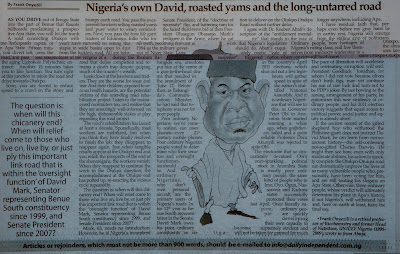 By Frank Onyezili
By Frank Onyezili
As you drive out of Enugu State into
the part of Benue that flaunts billboards proclaiming a prospective Apa State,
you will hit the trunk A road connecting Otukpa with Otukpo, the anticipated
capital of the dream Apa State. Fifteen minutes later, you divert left, cross
the same Otukpa-Otukpo road, and pass the aging Ugbokolo Polytechnic entrance. Another 15 minutes takes you to Eke Junction.
You turn right at this junction to rejoin the road and drive towards Otukpo.
Soon, you are forced to reduce speed
to a crawl on the stony and bumpy earth road. You pass the ever-present hawkers
selling roasted yams and ‘pure’ water to weary commuters. Next, you pass the bona fide garri traders of Edumoga,
folks who for years have survived on selling this staple in wide basins open to
dust from the luckless road. All are helpless stakeholders in the enigma of a
road that defies completion and remains a death trap despite gulping much of the
country’s wealth.
Look closer at the hawkers and
traders. They are the worse for wear and tear. And their children, exposed to
serious health hazards, are the potential victims of this unending road
rehabilitation project. Listen to the endangered commuters too, and realize
that they are amazingly well-informed on the high, dishonorable stakes at play
regarding this road project.
The road’s rehabilitation has lasted
at least a decade. Sporadically, road workers are mobilized, but when you think
they have finally resolved to finish the job, they disappear, to reappear again.
Just when tangible results appear at the Otukpo end and you relish the prospects
of the end of the shenanigans, the workers vanish. When they reappear to continue
the work in the Otukpa direction, the accomplishment at the Otukpo end has potted
up, re-enacting the vicious cycle repeatedly.
The question is: when will this chicanery
end? When will relief come to those who live on, live by, or just ply this important
link road that is within the ‘oversight function’ of David Mark, Senator representing
Benue South constituency since 1999, and Senate President since 2007?
Mark, 63, needs no introduction.
However, he is Nigeria’s incumbent Senate President, of the “doctrine of
necessity” flip, and battering ram for the failed third-term bid of then
President Olusegun Obasanjo. Mark’s pedigree is the Army, where he cut his
teeth, becoming relevant in 1984 as the military governor of Niger State. Later,
during the Ibrahim Babangida era, anecdotes put him at the centre of a gun-to-the-head
drama that resulted in the annulment of ‘June 12’. Before then, as Babangida’s Communications
Minister, he had said that telephony was not for poor people.
Poor ordinary Nigerians, we’ve come
to realize, can own phones—even 21st century mobile phones. Poor ordinary
Nigerian people voted to determine who their senators and oversight
functionaries should be. And ordinary Nigerians, who don’t own personal
aircraft, are the primary users of Nigeria’s roads. In his 12th year
as Benue South representative in the Senate, David Mark owes his poor, ordinary
constituents an obligation to deliver on the Otukpo-Otukpa Road without further
delay.
I agree with Dr. Reuben Abati’s description of
the “entitlement mentality” that stands in the way of work that Nigeria’s
legislators should do. Abati’s exquisitely poetic “gale of surprises”, triggered
in the country’s April 2011 elections, which shut out not a few legislators, will
gather speed in spite of the nation’s stultified National Assembly. And it is ordinary
Nigerians that will see to this, as Governor Peter Obi in Anambra State started
learning a while ago, when godfatherism failed and a quite sellable Professor Dora
Akunyili was rejected to spite Obi.
The electorate that so
dramatically devalued Obi’s once-sparkling political stock in Anambra State is
mostly poor ordinary people, the same kind of people who in Imo, Oyo, Ogun, Nassarawa
and Kaduna states successfully protected their votes last April. Once literally
supine, ordinary people are quickly developing their own capacity to become supremely
strident and will not be taken for granted for much longer anywhere, including Apa.
I have residual faith
that, perhaps even before my gray hairs lie in earthy rest, Nigeria will emerge
from the stifling grip of politicians. Ordinary people, now hostages of
Nigeria’s ruling class, will free themselves from mediocre leadership in a
nation where convicts still hold court. The pace of liberation will accelerate
and celebrating corruption will end. President Goodluck Jonathan, for whom I did
not vote because olives don’t birth figs, may yet continue his run of rare luck
and turn out to be PDP’s joker. By not bowing to the zoning arrangement of his
party, he epitomizes this new stridency of ordinary people, and his 2011 election
victory suggests that equal access to political power, social justice and
equity is already afoot.
| Sen. David A. Mark |
If the ancient record of the gifted
shepherd boy who withstood the Philistine giant does not instruct David Mark, he
can learn from not-so-ancient history—the self-confessing not-so-gifted Charles
Darwin. He might then see how, even with only moderate abilities, his action to
quickly complete the Otukpo-Otukpa road can dramatically improve the lives of so
many vulnerable people who, presumably, have been voting for him, and are still
touting his slogans on Apa State. Otherwise, these ordinary people, whose
verdict will ultimately determine his place in Apa’s history, if not Nigeria’s,
will withstand him and, here on earth at least, have the final say.
Frank
Onyezili is a retired professor of Biochemistry and former Head of Nutrition,
UNICEF Nigeria (1998-2009)
No comments:
Post a Comment